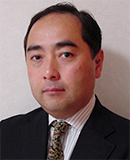
Chikara Kunisaki, MD., PhD.
Congress President
The 94th Annual Meeting of
the Japanese Gastric Cancer Association
(Department of Surgery, Gastroenterological Center,
Yokohama City University)
It is my pleasure to announce that the 94th Annual Meeting of the Japanese Gastric Cancer Association will be held from March 2 (Wed) to 4 (Fri), 2022, at PACIFICO Yokohama (Yokohama Minato Mirai). It is a great honor to serve you on behalf of the Japanese Gastric Cancer Association, which has a long history and various traditions; I am ready to fulfill my responsibility to the best of my ability.
Japan has a long history of gastric cancer research. Needless to say, with the highest quality and quantity of gastric cancer research, Japan has been the biggest contributor to this field worldwide. Many studies have reported new prophylactics and therapeutics which, although not completely satisfactory, have significantly improved treatment results. In addition, changes in lifestyle have decreased the incidence of Helicobacter pylori infection and reduced the morbidity and mortality of gastric cancer. Still, 100,000 people develop gastric cancer every year, of which 50,000 die. Thus, we believe that further improvements in diagnostics and therapeutics are imperative.
In the past 25 years, various advancements in research and technology in various fields have facilitated better medical research. In the field of basic science, remarkable progress has been seen in molecular biological technology, such as the development of next-generation sequencing and production of induced pluripotent stem cells; these techniques have already been widely adopted in medical practice, including in genome medicine and regenerative medicine. Advancements in optical technology have enabled examination using magnifying endoscopy and ultramagnifying endoscopy; these advancements have reached a stage wherein an endoscopic diagnosis system for gastric cancer controlled by artificial intelligence can be constructed.
Advancements in engineering have not only enabled endoscopic surgery but also led to the clinical application of robotic surgery as well as the provision of stable surgery. Therefore, gastric cancer treatment using these technologies has started to receive insurance coverage. We hope that these treatment methods will take gastric cancer research and therapeutics to the next stage.
We have decided “Patience and efforts lead you to success” as the theme of the 94th Annual Meeting. It is true that great advancements have been made in gastric cancer research and therapeutics, but we must keep making giant leaps hereafter. To our satisfaction, the leaps in research and therapeutics so far have yielded fruit, and thus, we can expect the number of gastric cancer patients to decrease in the next 20–30 years. Thus, to expedite further advancement of gastric cancer therapeutics, we now need to consolidate the authorization of gastric cancer therapeutic facilities and the development of medical specialists. Based on the distribution of clinical stages, gastric cancer patients are polarized into early cases and progressive recurrence cases and the proportion of older patients will increase steadily in the future. We need to properly cope with this situation.
During the 94th Annual Meeting, we plan to present special lectures, discussions on each subject, educational sessions, and international sessions that will help us solve the various challenges in this field and provide better gastric cancer therapeutics. We hope to have enthusiastic discussions toward next generation gastric cancer therapeutics and look forward to a beneficial time with all of you. All of our team members are wholeheartedly preparing every day. We hope from the bottom of our hearts that many of you will participate in the meeting.


